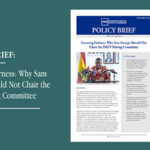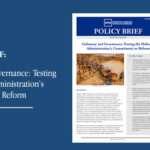IPPG Warns Against Tariff Hikes, Urges PURC to Consult Broadly

The International Perspective for Policy & Governance (IPPG) has expressed deep concern over recent proposals by the Electricity Company of Ghana (ECG), Ghana Grid Company (GRIDCo), and the Volta River Authority (VRA) to raise tariffs by 224%, 130%, and 59% respectively.
If approved, these adjustments would represent some of the steepest hikes in Ghana’s history, with profound implications for households, businesses, and the wider economy including triggering inflationary pressures across all sectors, compromising industrial competitiveness, and encouraging grid defection among consumers.
According to IPPG Research Fellow, Seth Owusu‑Mante, “Electricity tariffs in Ghana have historically been heavily subsidized, creating structural imbalances in the sector. At the same time, inefficiencies including high technical and commercial losses and revenue leakages remain a challenge.
Passing these inefficiencies onto consumers without clear reforms undermines public trust.”
IPPG notes that while Ghana must steadily move towards cost‑reflective tariffs, doing so through sudden and sharp increases risks worsening the cost‑of‑living for Ghanaians. This concern is further compounded by recent adjustments, including a 14.75% electricity tariff increase for the 2nd quarter of 2025, a further 2.45% tariff increase for the 3rd quarter, and a GH¢1 fuel levy per litre introduced to support thermal plant fuel purchases.
These cumulative burdens place enormous strain on both households and businesses already navigating economic pressures.
The utilities have argued that the requested tariff hikes are necessary to sustain their operations. GRIDCo points to the high cost of maintaining and expanding transmission infrastructure, presenting a detailed justification for achieving a cost‑reflective tariff, while ECG emphasizes the need to restore its financial viability in the face of inflation and exchange rate pressures. VRA, on its part, cites full cost recovery of power generation supplied for distribution.
While these challenges are real and action to address them cannot be deferred indefinitely, they highlight deeper structural issues highlighted in IPPG’s July 2025 report, “Securing Ghanas Energy Future꞉ Policy Actions for Sustainability and Efficiency”, and cannot be resolved by simply passing costs on to consumers.
The Public Utilities Regulatory Commission (PURC) already adjusts tariffs every quarter based on external factors such as the exchange rate, inflation, fuel costs, and the power generation mix. While this process may not fully account for utilities’ operational and infrastructure expansion costs, it is notable that despite multiple adjustments in recent years, persistent inefficiencies and service quality challenges remain unresolved. This pattern calls for a different approach, one that links tariff adjustments to measurable performance improvements and operational excellence.
Although Ghana does need a roadmap towards cost‑reflective tariffs, IPPG stresses that this must be achieved gradually and transparently. IPPG therefore calls on the Public Utilities Regulatory Commission (PURC) not to approve the tariff hikes in their current form, but rather to consult widely with stakeholders including consumer groups, businesses, and civil society to assess the real economic and social impact before taking any decision.
IPPG further recommends that꞉
1. Any tariff adjustments should be incremental and phased, to allow households and businesses time to adjust.
2. PURC must tie tariff approvals to verifiable efficiency improvements by utilities, ensuring that higher revenues are matched with better service delivery.
3. Consumer protection measures, especially for lifeline consumers and low‑income households, must be strengthened to cushion the most vulnerable.
4. Government and PURC should communicate transparently on the reasons for adjustments and the safeguards in place, to build public confidence.
“Reliable electricity supply is critical for Ghana’s development, but sustainability cannot come at the expense of fairness,” Mr. Owusu‑Mante emphasized, affirming IPPG’s belief that achieving the sector’s sustainability requires more than periodic tariff adjustments. While recognizing the legitimate need for cost‑reflective pricing, IPPG emphasizes that such adjustments must form part of a broader transformation agenda prioritizing operational efficiency, transparent governance, and accountable service delivery. Mr. Owusu‑Mante concluded that “Ghanaians
deserve an electricity sector that not only recovers its costs but also delivers reliable, efficient, and affordable service.”
For more information, please contact꞉
Roselyn Buerki Plahar
Communications Coordinator
(r.buerkiplahar@ippgafrica.org)

 Previous Post
Previous Post Next Post
Next Post